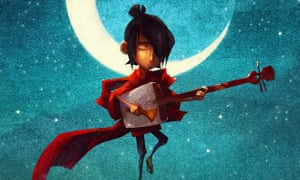Kubo and the Two Strings
An American Studio Ghibli: Why Laika's Kubo and the Two Strings is Oscar-worthy
The beautiful animated fantasy lost out to Disney’s Zootopia at the Golden Globes, but that shouldn’t determine its fate at the Academy Awards
Moments into Kubo and the Two Strings, Laika’s latest masterful missive from the darkling heart of childhood reveries, it is clear that this is no ordinary Hollywood animation. In place of talking dinosaurs or cuddly anthropomorphic critters, we witness a desperate young mother trying to save her newborn child from the treacherous waves. She catches the precious bundle before it is swept away, but it’s revealed the helpless baby has been horribly wounded, one tiny eye gouged out by unknown assailants.
With the success of animated movies at the box office over the past decade, competition in this once threadbare category has picked up radically in recent years. Nevertheless it is a travesty that none of Laika’s films have ever won either top prize. ParaNorman, the studio’s kidney-curdling tale of a young boy who sees dead people, had a strong shout in 2012 but lost out to a lesser Pixar effort, the rambunctious medieval fantasy Brave. Kubo and the Two Strings will most likely have to beat not just Zootopia, but Pixar’s $1bn Finding Dory and another much-seen Disney effort, Moana, if it is to buck the trend at this year’s Oscars.The Golden Globe for best animated film has also been won, lest we forget, by such lesser offerings as Pixar’s Cars, in 2006, and The Adventures of Tintin, in 2011. The equivalent Oscar has gone to George Miller’s middling tale of toe-tapping Penguins, Happy Feet, and the hardly stupendous, Cat Ballou-riffing western Rango.
The Hollywood Foreign Press Association’s decision to garland the year’s better-known animated movies is nothing new. Laika’s films receive nominations, but always seem to lose out on the top prize, in part as an unfortunate consequence of timing. Coraline, Henry Selick’s bewitching tale of a young girl who discovers a sinister dystopia through a psychedelically rendered bolt-hole in the wall of her new home, lost out to Pixar’s equally fabulous Up at both the Oscars and the Golden Globes in 2009. Laika’s wonderfully whimsical The Boxtrolls was beaten by Disney’s soaring cross-cultural comic book caper Big Hero Six at the Oscars and (less reasonably) by How to Train Your Dragon 2 at the Globes, in a competitive 2014 in which The Lego Movie and Studio Ghibli’s The Tale of the Princess Kaguya were also under consideration.
When Studio Ghibli closed its doors – perhaps for good – in 2014, there was palpable distress from animation fans and professionals alike that we may never again get the chance to witness such eccentric tales from the hidden corners of our barely formed dreams as Howl’s Moving Castle, Spirited Away or My Neighbour Totoro. Laika seems to tap into the same rich vein of half-remembered youthful fantasies as the Japanese company, yet it is rarely mentioned in the same breath by critics. Ghibli won the best animated film Oscar in 2003 for Spirited Away, so why does the US animation community that votes for these prizes routinely fail to honour an American equivalent based on its own doorstep?
Instead, the Academy and HFPA usually go for the year’s biggest animated hits at the box office, despite the fact that these movies have already been seen by the vast majority of filmgoers. It’s a completely different approach to the one taken by voters in other categories, who often use their influence to garland lesser known films that might only be on the radar of critics or dedicated cineastes. Slumdog Millionaire in 2009, The King’s Speech the following year, and last year’s The Revenant only became blockbusters once they found themselves enveloped in a warm cloak of awards season buzz.
Next month’s Oscars will naturally offer the greatest dose thus far of the vital oxygen of publicity, with Damien Chazelle’s La La Land already looking likely to be this year’s grateful recipient. Kubo and the Two Strings, which has so far made just $70m at the global box office – barely covering its production budget – is more than deserving of a hit.

Leave a Comment